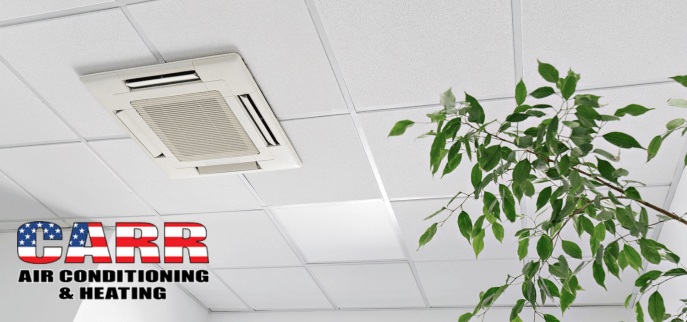How to improve the air quality in your home during the summer months.
As summer rolls in, our homes become sanctuaries from the heat, but poor indoor air quality (IAQ) can pose significant health risks. With doors and windows shut tightly to keep out the sweltering heat, it’s vital to focus on indoor air quality control during the warmer months.
From volatile organic compounds (VOCs) to poor ventilation, summer brings specific challenges that homeowners must address. This guide will go through essential steps to improve air quality and explain the role of AC repair, maintenance, and installation services in maintaining a healthy home environment.
The Importance of Indoor Air Quality Control
The Environmental Protection Agency (EPA) emphasizes that indoor air quality can be worse than outdoors, leading to a range of health effects. The Occupational Safety and Health Administration (OSHA) also warns that short-term and long-term exposure to indoor air pollutants can result in respiratory issues, headaches, and even cardiovascular diseases.
Key Factors Affecting Indoor Air Quality
- Building Materials: Formaldehyde, asbestos, and other hazardous substances in materials like insulation can impact air quality.
- Gas Stoves: Can release nitrogen dioxide (NO2), increasing pollution levels indoors.
- Volatile Organic Compounds: Found in everyday household products like cleaning supplies and paints.
- Poor Ventilation: Traps pollutants and reduces fresh air circulation.
- Poor AC Maintenance: An unmaintained air conditioning system can circulate allergens, dust, and pollutants.
Sources of Indoor Air Pollution in Your Home
Building Materials and Volatile Organic Compounds (VOCs)
Many modern building materials contain chemicals like formaldehyde, a known VOC. Carpets, plywood, and even furniture can off-gas these compounds, leading to high levels of indoor air pollution.
Household Appliances
Gas stoves are a significant source of nitrogen dioxide and carbon monoxide indoors. Without proper ventilation, these pollutants can accumulate, resulting in poor indoor air quality.
Air Conditioning Systems
Your air conditioning system can be a double-edged sword. On one hand, it keeps you cool and filters out some pollutants, but on the other hand, if not properly maintained, it can circulate dust, mold, and allergens throughout your home.
Biological Contaminants
Mold, bacteria, and dust mites thrive in humid conditions, especially in the summer. Poor ventilation and high humidity levels can exacerbate these issues.
Health Effects of Poor Indoor Air Quality
Short-Term Effects
- Eye, Nose, and Throat Irritation: Caused by exposure to common indoor pollutants.
- Headaches and Fatigue: Often linked to volatile organic compounds.
- Dizziness and Nausea: Common symptoms of exposure to carbon monoxide and nitrogen dioxide.
Long-Term Effects
- Respiratory Diseases: Asthma, bronchitis, and other conditions can be triggered by prolonged exposure to irritants.
- Cardiovascular Issues: Long-term exposure to pollutants can increase the risk of heart disease.
- Cancer: Some VOCs are carcinogenic and can contribute to cancer development.
Improving Indoor Air Quality During the Summer
1. Regular AC Maintenance and Repair
- Routine Maintenance: Schedule routine AC maintenance to clean filters, inspect ductwork, and ensure optimal system performance.
- Filter Replacement: Replace AC filters every 1-3 months to prevent the circulation of dust and allergens.
- Duct Cleaning: Clean ducts periodically to remove mold, bacteria, and accumulated dust.
2. Proper Ventilation
- Install Exhaust Fans: Especially in kitchens and bathrooms, to reduce high levels of moisture and pollutants.
- Open Windows: When temperatures allow, open windows to let in fresh air and reduce indoor pollutants.
- Balanced Ventilation: Consider balanced ventilation systems like heat recovery ventilators (HRVs) to improve airflow without sacrificing cooling.
3. Control Humidity Levels
- Dehumidifiers: Use dehumidifiers to keep humidity below 50% and reduce the proliferation of mold and dust mites.
- AC Efficiency: Ensure your air conditioning system is operating efficiently, as it can help regulate humidity levels indoors.
4. Minimize VOC Emissions
- Choose Low-VOC Products: Opt for low-VOC paints, adhesives, and cleaning supplies.
- Proper Storage: Store chemicals and cleaning agents in tightly sealed containers away from living areas.
- Green Building Materials: Use environmentally friendly building materials when renovating.
5. Utilize Air Purifiers
- HEPA Filters: Air purifiers with HEPA filters can effectively capture small particles and improve air quality.
- Activated Carbon: Purifiers with activated carbon filters can remove odors and VOCs.
6. Consider AC Installation Services for Upgrades
If your current system is outdated, consider upgrading with professional AC installation services. Newer models come with advanced filtration systems that can significantly reduce pollutants and improve overall indoor air quality (IAQ).
Summary: Taking Control of Your Indoor Air Quality
Indoor air quality control is crucial, especially during the summer, when heat, humidity, and tightly closed windows exacerbate indoor air quality problems. Prioritize regular AC maintenance, repair, and upgrades to ensure your air conditioning system effectively filters pollutants and provides fresh air. Reduce exposure to sources of indoor air pollution in your home by using low-VOC products, ensuring proper ventilation, and controlling humidity.
Key Takeaways
- Schedule regular AC maintenance to improve system performance and air quality.
- Increase ventilation and consider air purifiers for comprehensive pollutant removal.
- Address high levels of humidity with dehumidifiers and proper ventilation.
- Opt for low-VOC building materials and cleaning products to reduce emissions.
Contact Carr AC to Improve Indoor Air Quality
By implementing these steps, you’ll enjoy improved health and a more comfortable living environment throughout the summer months. Prioritize your family’s well-being by staying proactive with indoor air quality control and seeking professional help for any AC repair, maintenance, or installation needs.

